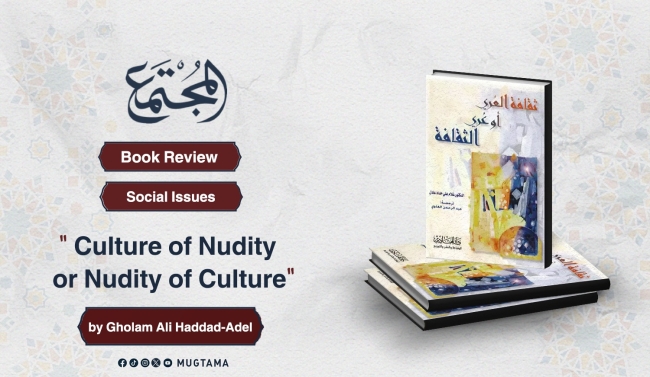Book Review: "Culture of Nudity or Nudity of Culture" by Gholam Ali Haddad-Adel
"Culture of Nudity or Nudity of Culture" is a book authored by Gholam Ali Haddad-Adel, an Iranian scholar and politician, in which he critiques Western culture, focusing on women's rights and the hijab. The book was first published in 1981 in Persian and translated into Arabic by Abdul Rahman Al-Alawi in 2001.
The book explores the relationship between clothing and societal culture, arguing that a person’s attire reflects societal norms rather than individual taste. In Western societies, the disregard for these norms has led to the spread of a "culture of nudity." The author attributes this phenomenon to Western society's immersion in materialism and desires, leading to a departure from spirituality. As a result, women are viewed as commodities and tools for stimulating markets and boosting the capitalist economy. Haddad-Adel highlights the exploitation of women in advertising and the arts, including nude theater performances and sexual scenes, which have reinforced this culture.
The book examines the various factors influencing the style and size of clothing without delving into their effects or discussing religious perspectives on clothing standards. It addresses the connection between Western clothing, its culture, and capitalism, as well as the historical context of nudity and the relationship between the hijab and Islamic culture. The book also discusses the Westernization of traditional Japanese attire. Comparing the philosophy of clothing in post-Renaissance Europe with non-Western societies, Haddad-Adel asserts that "Western clothing is short and tight," while Eastern clothing is "long and loose," reflecting contrasting societal concepts of humanity.
The author notes that the culture of nudity can infiltrate conservative societies either coercively, as seen with Reza Khan in Iran, who enforced the removal of the hijab, or through the influence of the aristocracy and celebrities. Haddad-Adel explains that the general public often feels compelled to emulate this affluent class, likening them to sheep following their shepherd.
In conclusion, Haddad-Adel emphasizes the importance of the hijab in achieving modesty and chastity. He argues that it plays a role in regulating human instincts and preserving the family structure, which is essential for societal stability. He contends that clothing is not merely a piece of fabric but a reflection of a society's values, culture, and worldview.
"Culture of Nudity or Nudity of Culture" is a critical study that highlights the impact of Western culture on Eastern societies, particularly regarding clothing and women's roles. The book offers an analytical perspective on how a society's worldview influences the appearance and behavior of its members, stressing the importance of safeguarding cultural and religious values in the face of modern challenges.
The book has received significant attention, with multiple reprints reaching its 23rd edition in 2014. It has also been translated into several languages, including Arabic and Urdu, and has been discussed in academic and cultural forums, where it is regarded by some as an essential reference for understanding the relationship between clothing and culture.
-------------------------------------------------------------


